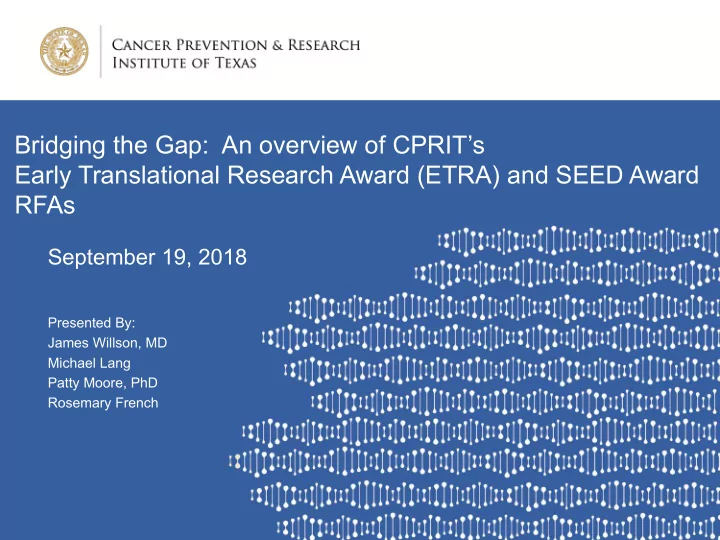

Bridging the Gap: An overview of CPRIT’s Early Translational Research Award (ETRA) and SEED Award RFAs September 19, 2018 Presented By: James Willson, MD Michael Lang Patty Moore, PhD Rosemary French
Bridging the Gap: ETRA and SEED Award RFAs AGENDA 12:00 – 1:00 p.m. RFA Overview + Q&A James Willson, M.D., CPRIT Chief Scientific Officer Mike Lang, CPRIT Chief Product Development Officer 2
CPRIT’s Role in Fighting Cancer CPRIT focuses on discovery and translational stages of cancer research Research Discovery Translational Stages Research Research FDA Drug Discovery Preclinical Clinical Trials Mfg. Clinic Review Phase I & II Phase II Phase III Phase IV Drug Development 5K-10K Pipeline 250 5 1 FDA Approved Drug Compounds Public & Largely Industry & Funding Private Largely Public Funded For Profit Funded Sources (Underfunded) “Valley of Death” Timeline Ongoing/Indefinite 3-6 Years 6-10 Years 0.5-2 Years 3
Early Translational Research Award • Projects from academic investigators that "bridge the gap" between promising new discoveries and commercial development. • PI and development experts collaborate to address commercial viability. • Deliverable is validated compound, device or assay and well defined business opportunity ready to attract private investment Research Basic Translational Stages Research Research FDA Drug Discovery Preclinical Clinical Trials Mfg. Clinic Review Phase I Phase Phase Phase II III IV 5K-10K Drug 250 5 1 FDA Approved Drug Development Compounds Pipeline Largely Public Funded Largely Industry & Public & Funding e.g. NIH, DoD For Profit Funded Sources Private “Valley of Death” 3-6 6-10 Years 0.5-2 Ongoing/Indefinit Timeline Years Years e 4
Early Translational Research Award (ETRA) Who should apply for the ETRA ? Academic investigators whose research is ready for § development toward an investible technology and business opportunity. Target validation completed Ø Early hits identified Ø Prototype device concept or diagnostic test developed Ø Basic research to identify or validate a new target or to • support new hit generation is NOT responsive. Proposals to conduct early phase clinical trials are NOT • responsive. 5
Components of the ETRA Application Background and development plan § scientific impact and innovation Ø ready for product development stage Ø Comprehensive Business Plan § clinical utility Ø target market Ø how intellectual property will be protected Ø Target product profile (TPP) • documents the path of product development Ø Identifies milestones for go/no go decisions Ø Letter of Support from the Chief Technology Transfer • Officer or equivalent 6
ETRA Funding Information $2,000,000 over a period of 1 - 2 years § Institutional limits on number of applications § Co-PI with development expertise encouraged § Consultants to provide special expertise § Services outsourced to a contract lab services § organization 7
SEED Award • Start-up or established firms developing innovative products or services • Significant potential impact on patient care specific to cancer • Scientific “Proof of Principle” demonstrated Research Basic Translational Stages Research Research FDA Drug Discovery Preclinical Clinical Trials Mfg. Clinic Review Phase I Phase Phase Phase II III IV 5K-10K Drug 250 5 1 FDA Approved Drug Development Compounds Pipeline Largely Public Funded Largely Industry & Funding Public & e.g. NIH, DoD For Profit Funded Sources Private (Underfunded) “Valley of Death” 3-6 6-10 Years 0.5-2 Ongoing/Indefinit Timeline Years e Years 8
SEED Awards Eligibility Cancer Specific – Therapy, Diagnostic or Sequelae • treatment Sector Agnostic – Therapeutics, Diagnostics, Devices, • Development Services Texas – Current TX company or willing to relocate post • award (specific criteria) Stage – Preclinical (with POC) to Clinical Phase 1 or • Phase 2a Award Company applicants can request up to $3M over maximum • timeline of 36 months 9
SEED Awards Application Process RFA expected to be offered: (see website for more details) • FY 2019: one more cycle • FY 2020: one cycle • FY 2021: one cycle • Peer reviewed for scientific merit, business fundamentals and • clinical impact Multi-step review process; typically 6 months from application to • approval Administrative Review • Peer Screening Review • In-person Presentation • Due Diligence • 10% success rate • 10
SEED Award: Key Issues for Applicants Assessment Criteria Novel technology – Revolutionary not Evolutionary • Strong Scientific Fundamentals and Validation • Comprehensive Development Plan – Preclinical Development, Clinical • Trials, Regulatory, Reimbursement etc. Management Team • Clinical Impact • Business Fundamentals and VC Investment Attractiveness • Awards Contract with annual review – meet milestones to maintain funding • Thx Revenue Sharing: 3% to 5% stepped royalty to 4x award, then 0.5% • 50% match required • 11
Key Dates – ETRA 19.2 Cycle Process Timeline RFA Posted August 17, 2018 CPRIT Application Receipt October 17, 2018 System (CARS) Opens CPRIT Application Receipt January 30, 2019 System (CARS) Closes Peer Review May 2019 – August 2019 Award August 31, 2019 12
Key Dates – SEED Award 19.2 Cycle Process Timeline RFA Posted November 20. 2018 CPRIT Application Receipt December 5, 2018 System (CARS) Opens CPRIT Application Receipt January 30, 2019 System (CARS) Closes Peer Review April 15 - 18, 2019 Contract Start Date August 31, 2019 13
Contact Information Phone: 866-941-7146 Email: Help@CPRITGrants.org Monday through Friday, 7 a.m. to 4 p.m. CT 14
Scientific and Programmatic Questions ETRA Contact: Patty Moore, Senior Program Manager for Research Phone: 512-305-8491 Email: pmoore@cprit.texas.gov SEED Contact: Rosemary French, Program Manager for Product Development Phone: 512-305-7676 Email: rfrench@cprit.texas.gov Web: www.cprit.state.tx.us 15
Questions? Submit your questions using “Questions” on the GoTo • Webinar control panel. You do this by typing your question into the question box • and clicking SEND. 16
Recommend
More recommend